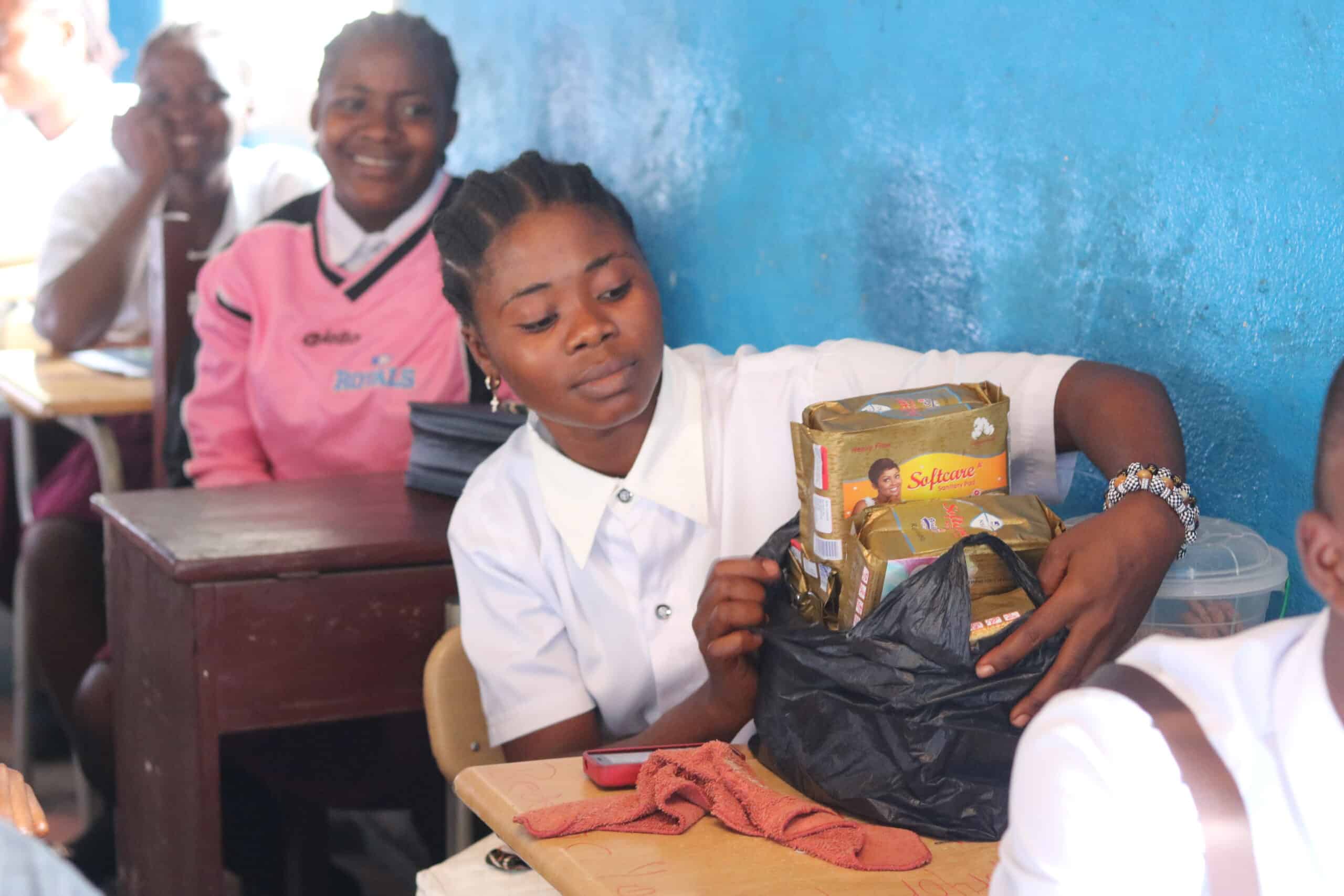This week and last, trucks have been fanning out to schools across 12 counties in Liberia loaded with a product that isn’t often associated with academic success: sanitary pads.
The Johns Hopkins Center for Communication Programs-led Breakthrough ACTION project, which has been working to reduce stigma around menstrual periods among young people in Liberia, is making the special deliveries to more than 800 schools, with enough pads to provide as many as 77,000 Liberian adolescent girls with a two-month supply of sanitary products and a bar of soap to help with handwashing. CCP is working alongside the ministries of health, education and gender to make this huge undertaking successful.
The distribution of supplies dovetails with a series of project-led school and community dialogues held throughout this year with girls and boys, parents, caregivers, religious and traditional leaders, and teachers all in the name of making people more comfortable talking about the natural process of menstruation.
As the new school year starts, the ongoing series of school-based dialogues focus on highlighting the biological processes of puberty and menstruation, explaining the basics of menstrual period hygiene and discouraging period stigma among young people.
CCP’s Juliet Wilson, senior social and behavior change program officer for Breakthrough ACTION Liberia, sees the campaign as “not just sanitary pads distribution, but a way of ensuring all school girls have adequate knowledge about menstrual health and hygiene.”
Says CCP’s Lindsey Leslie, the social and behavior advisor for Breakthrough ACTION Liberia:“In Liberia, menstruation is associated with shame. However, we believe it should be an open discussion. It’s everyone’s business. Reframing menstruation is a key aspect of the school-based campaign discussion. And what may be most important: By distributing packs of sanitary pads in schools, girls may no longer see menstruation or the lack of sanitary products as a barrier to attending class.”
Typically, CCP works to help people adopt healthy behaviors through social and behavior change communication. Often, CCP works with partners to supply the service or commodity (such as vaccine uptake or the distribution of insecticide-treated bed nets to prevent malaria).
“But with this effort we have a unique opportunity to discuss menstruation and then provide commodities that girls can immediately use to practice improved menstrual hygiene behaviors,” Leslie says. “It’s exciting.”
CCP’s Moses Shilue Sr., a regional field manager for the Liberia project, says the impact of the pad distribution has been immediate, particularly in Margibi County, on the coast. He has witnessed adolescents who “are now speaking freely and creating awareness about menstruation in their classes- especially among their friends that were feeling shy,” he said.
In three schools so far, he said, his team spoke to four girls who did not have access to menstrual products. “They were to leave school because they were [on their period],” Shilue Sr. said. “They used the pads we provided to stay in school.”
Schools and students have already started to express their appreciation for the campaign and the menstrual health products.
Handful Peters, a student of Francis Nya Manweah Public in Nimba County in northeastern Liberia, said she is “so grateful” to those who provided the pads.
“The money I would have used for buying pads will now be used to buy other school materials,” including a notebook, she says.
Normalizing menstruation can only happen if programs address cultural norms, religious beliefs and socio-economic barriers that contribute to the stigma, Leslie says. Girls sometimes resort to using unhygienic alternatives to sanitary products, leading to health risks. They report being bullied in school when they have their periods or skipping school altogether. This bullying can prevent girls from staying in school.
While girls are clearly the focus of this month’s distribution, boys are key to creating a safe space for those who are menstruating.
“Boys are not forgotten, because they’re also important in terms of discouraging period stigma and bullying,” Leslie says. “Meanwhile, teachers or school administrators sit in on the dialogues so they can be poised to continue promoting the health behaviors around menstruation.”
Leslie says she and the team are pleased with the distribution so far. So are the girls, who appreciate that menstruation is being talked about openly.
“Now we know we should be proud of [our period], instead of shy,” said Favor Halley, a student at the Free Pentecostal School in Lofa County in northern Liberia.
“I’m going to use pads whenever I’m menstruating,” said classmate Margaret Kolley. “And, I’m going to share the information with my friends.”





